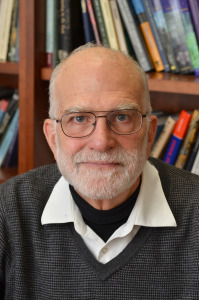
Have we reached a pinnacle in our evolutionary development as a species?
Dr. Stephen Stearns, a professor of ecology and evolutionary biology at Yale University, is studying the factors that influence contemporary evolution.
Prof. Stephen Stearns specializes in life history evolution, which links the fields of ecology and evolutionary biology, and in evolutionary medicine. He came to Yale in 2000 from the University of Basel, Switzerland, where he had been professor of zoology since 1983 and held several administrative posts. A 1967 graduate of Yale College, Stearns earned a M.S. from the University of Wisconsin and a Ph.D. from the University of British Columbia. He was a Miller Fellow at the University of California, Berkeley, before taking up an appointment at Reed College prior to moving to Switzerland. Prof. Stearns founded and has served as president of both the European Society for Evolutionary Biology and the Tropical Biology Association and founded two journals, the Journal of Evolutionary Biology and Evolution, Medicine, and Public Health.
Continuing Human Evolution
![]()
Has modern medicine cut mortality so much that we are no longer exposed to natural selection?
Are humans still evolving?
A trip to a cemetery brings home how many infants died young and how many women died in childbirth right through the 19th century. Those questions point to an essential fact: selection operates through differences in reproductive success, the number of children that different people have per lifetime, not just through differences in mortality.
We decided to see how selection operated on the population of Framingham, Massachusetts, during the 20th century.
Framingham has been the focus of a long term study of factors contributing to heart disease. It began in 1948 and continues today. So far three generations have been followed: grandparents, parents, and grandchildren. We studied the strength of the correlations between traits and reproductive success. We found that selection was acting to cause gradual evolutionary change, shaping women to be slightly shorter and stouter, to have lower cholesterol and lower blood pressure, to have their first child earlier, and to reach menopause later. Selection continued to act because different women had different numbers of children.
We also found a relationship between reproduction and mortality. Women who had one or two children lived longer than those who did not have any, but women who had three or more children lost about a year of life for each additional child. We searched for genes associated with this cost and found several that have been linked to cancer.
Evolution in humans has not stopped, but culture, particularly the part of culture represented by medical technology, has become the strongest contributor to selection acting on humans. Because cultural developments are hard to predict, future human evolution is hard to predict. As Casey Stengel said, “Prediction is difficult. Especially about the future.”

Comments
2 responses to “Stephen Stearns, Yale University – Continuing Human Evolution”
Interesting piece. FWIW that quotation at the end is usually attributed to another sage of the NY Yankees, Yogi Berra.
Hi Bob! Thanks for the comment. Naturally, I wanted to check out the origin of this quotation, but Google has left me only more confused.
From my searching, I’ve seen the quote attributed to a bunch of folks, but it seems that Neils Bohr might be the true originator.